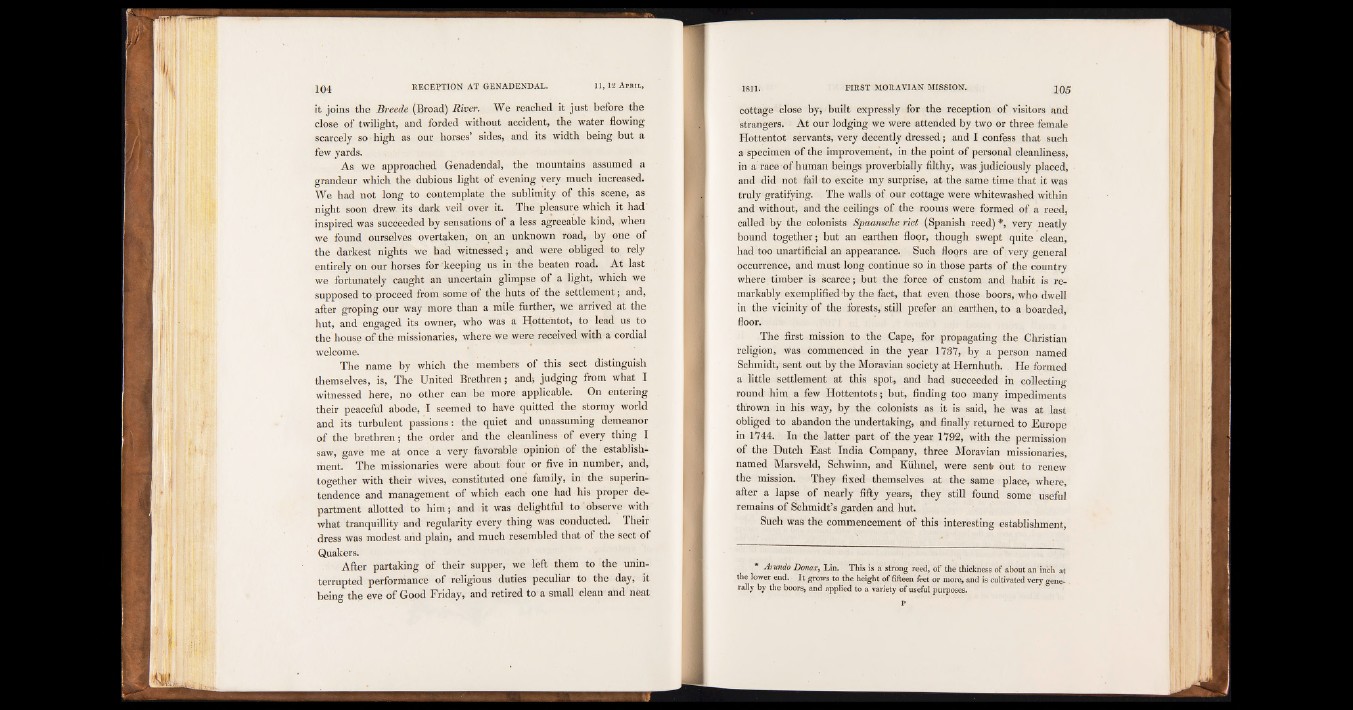
it joins the Breede (Broad) River. We reached it just before the
close of twilight, and forded without accident, the water flowing
scarcely so high as our horses’ sides, and its width being but a
few yards.
As we approached Genadendal, the mountains assumed a
grandeur which the dubious light of evening very much increased.
We had not long to contemplate the sublimity of this scene, as
night soon drew its dark veil over it. The pleasure which it had
inspired was succeeded by sensations of a less agreeable kind, .when
we found ourselves overtaken, on an unknown road, by one of
the darkest nights we had witnessed; and were obliged to rely
entirely on our horses for ‘keeping us in the beaten road. At last
we fortunately caught an uncertain glimpse of a light, which we
supposed to proceed from some of the huts of the settlement ; and,
after groping our way more than a mile further, we arrived at the
hut, and engaged its owner, who was a Hottentot, to lead us to
the house of thè missionaries, where we were received with a cordial
welcome.
The name by which the members of this sect distinguish
themselves, is, The United Brethren; and; judging from what I
witnessed here, no other can be more applicable. On entering
their peaceful abode, I seemed to have quitted the stormy world
and its turbulent passions: the quiet and unassuming demeanor
of the brethren ; the order and the cleanliness of every thing I
saw, gave me at once a very favorable opinion of the establishment.
The missionaries were about four or flve in number, and,
together with their wives, constituted one family, in the superintendence
and management of which each one had his proper department
allotted to him ; and it was delightful to observe with
what tranquillity and regularity every thing was conducted. Their
dress was modest and plain, and much resembled that of the sect of
Quakers.
After partaking of their supper, we left them to the uninterrupted
performance of religious duties peculiar to the day, it
being the eve of Good Friday, and retired to a small clean and nèat
cottage close by, built expressly for the reception of visitors and
strangers. At our lodging we were attended by two or three female
Hottentot servants, very decently dressed; and I confess that such
a specimen of the improvement, in the point of personal cleanliness,
in a race of human beings proverbially filthy, was judiciously placed,
and did not fail to excite my surprise, at the same time that it was
truly gratifying. The walls of our cottage were whitewashed within
and without, and the ceilings of the rooms were formed of a reed,
called by the colonists Spaamche riel (Spanish reed) *, very neatly
bound together; but an earthen floor, though swept quite clean,
had too unartificial an appearance. Such floqrs are of very general
occurrence, and must long continue so in those parts of the country
where timber is scarce; but the force of custom and habit is remarkably
exemplified by the fact, that even those boors, who dwell
in the vicinity of the forests, still prefer an earthen, to a boarded,
floor.
The first mission to the Cape, for propagating the Christian
religion, was commenced in the year 1737, by a person named
Schmidt, sent out by the Moravian society at Hernhuth. He formed
a little settlement at this spot, and had succeeded in collecting
round him a few Hottentots; but, finding too many impediments
thrown in his way, by the colonists as it is said, he was at last
obliged to abandon the undertaking, and finally returned to Europe
in 1744. In the latter part of the year 1792, with the permission
of the Dutch East India Company, three Moravian missionaries,
named Marsveld, Schwinn, and Kiihnel, were sent but to renew
the mission. They fixed themselves at the same place; where,
after a lapse of nearly fifty years, they still found some useful
remains of Schmidt’s garden and hut.
Such was the commencement of this interesting establishment,
Arundo Jjoaar, Lin. This is a strong reed, o f the thickness of about an inch at
the lower end. It grows to the height of fifteen feet or more, and is cultivated very generally
by the boors, and applied to a variety of useful purposes.